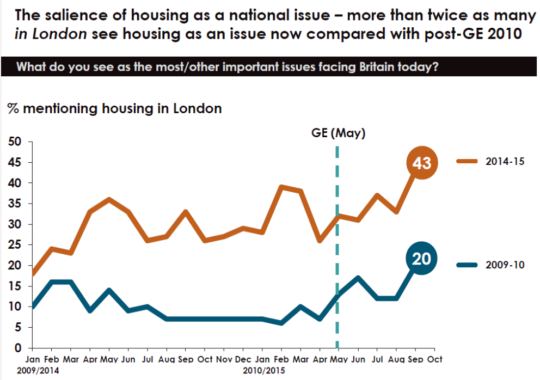It’s fair to say that the political importance of housing in London has increased dramatically in recent years.
When voters went to the polls in 2012, housing wasn’t at the forefront of their minds. At least not according to polling data, which showed that Londoners placed housing fourth down the list of political issues facing the capital. It ranked behind jobs, crime and transport.
Fast-forward four years, and we’ve just wrapped up an election referred to by the winner – now Mayor of London – as a ‘referendum on housing’. Polls throughout the election, from November through to May, repeatedly told the same story: housing was by far and away the most important issue to voters.
Both of the frontrunners, Sadiq Khan and Zac Goldsmith, ran campaigns that seemed to respond to this trend accordingly. Both prioritised housing policy, citing it as their number one issue; both pledged to build 50,000 homes a year; both offered some kind of “first-dibs” homeownership for Londoners. Yet an Opinium poll published in the Evening Standard the day before the election showed that Sadiq Khan was significantly more trusted – 32% vs 18% – on this critical issue. This gap in trust is particularly interesting given the number of similarities between the two candidate’s offerings on housing. It is worth asking then, why Zac Goldsmith, or Conservatives more generally, weren’t trusted on the election’s top issue.
The answer may lie with the ever-growing group of renters whose hopes of home ownership have been directly damaged by the deepening housing crisis. Many perhaps would’ve hoped to be home owners now, but spiralling house prices have left them stuck where they are. As Ross Clark wrote in the Spectator last week, “there is a huge and growing constituency of people under 40 whom the housing market has failed”. Polling data also shows that this slightly older group is the most concerned with housing – 47% of those aged 25-49 placed housing as their top issue, compared to the 42% of 18-25 year olds and 41% of those aged 50-64.

We know first-hand from focus groups and talking to people at streets stalls that many in this group have little faith in the current offers from government on “affordable housing”. Flagship products such as Starter Homes are inaccessible for a vast majority of them. The high cost of private renting also means they aren’t able to get ahead and save – on average, Londoners are only able to save £40 a month for a deposit. Even the rhetoric around the issue has become damaging; the phrase “affordable housing” is toxic, seen as an empty promise at best and a pernicious lie at worst. This group have seen house prices rise steadily since David Cameron was prime minister, and do not see “affordable housing” products as applicable to them.
This context and general mistrust of the solutions on offer undoubtedly had an impact on Goldsmith’s mayoral campaign. It is worth noting that his campaign was running alongside the passage of the contentious Housing and Planning Bill, which generated a steady stream of media coverage, questioning and criticising the government’s position on affordable housing. So much so that Goldsmith found himself publicly at odds with government policy, stating that the definition of “affordable homes” introduced in the Housing and Planning Bill, which has been extended to include Starter Homes, was “not all that helpful”. “Legally an ‘affordable home’ is a 20% discount,” he said, “but in the real world a 20% discount on a £600,000 home in Primrose Hill is not an affordable house to the vast majority of people.”
Housing was of course only one issue in this election, but Conservatives may well take heed of Zac Goldsmith’s defeat. Voters that should have been winnable seemingly weren’t convinced that they could trust what he said on affordable housing. Some within the party have been warning about this problem for a while. In May 2015 Nick de Bois, former MP for Enfield North, pointed to housing as a key vulnerability for Conservatives and a central factor in him losing his seat. Yet these warnings clearly haven’t been sufficient and the lesson has yet to be learnt; the same Nick de Bois who wrote that article a year ago, went on to become Zac Goldsmith’s campaign manager.
